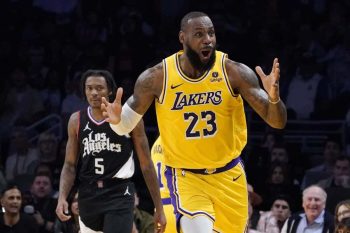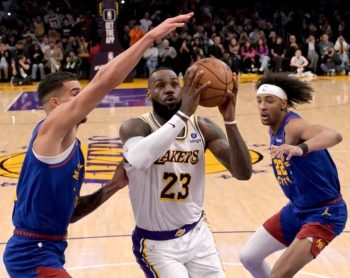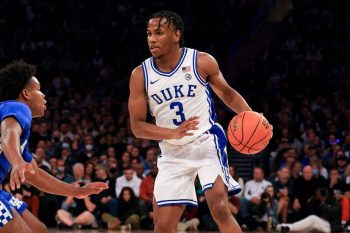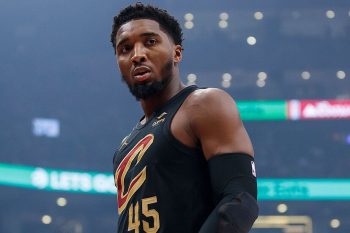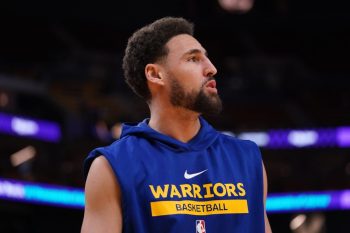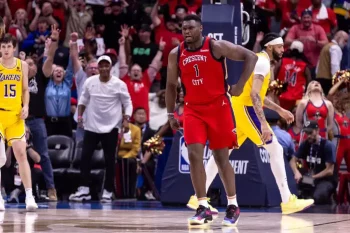NBA
NBA Sunday: Kevin Durant’s Easy Decision

The dichotomy was stark.
LeBron James stood out at center court. I keenly remember describing the look on his face as that of a seven-year-old child meeting his puppy for the first time on Christmas morning. In Miami, after ousting the Oklahoma City Thunder in five games, the king had risen.
I remember speaking with a member of James’ entourage after the game and hearing about how dark the past year had been for him. And there, after being on hand for the 2012 NBA Finals at Miami’s American Airlines Arena, before my very eyes, I saw LeBron James become a new man.
And one of the memories that will always stick with me from the 2012 NBA Finals is Kevin Durant.
As Dwyane Wade left the podium with the Larry O’Brien trophy cradled underneath his left arm, Durant prepared to address the media. All alone, with a few eyeballs watching and even less ears listening, Wade embraced Durant, encouraged him and promised him that his time was coming soon.
Four years later, Kevin Durant is still waiting.
* * * * * *
The Oklahoma City Thunder became the second Western Conference team in two years to squander a 3-1 series lead and now, as Durant faces free agency on July 1, all anyone has wanted to discuss is what they believe Kevin Durant will do. Few have weighed in on what he should do.
Over the years, even as Durant has seen some talented players exit — James Harden, Kevin Martin and Reggie Jackson are but a few — he has seemingly gotten closer to the championship that eluded him back in 2012. With Steven Adams, Enes Kanter, Serge Ibaka and Dion Waiters among those comprising he and Russell Westbrook’s support staff, one could make the argument that Durant now has the best supporting cast he has enjoyed since his time in the league.
This summer, Thunder general manager Sam Presti and his staff will take a long look at their roster. They will have to make a decision on Waiters and simultaneously try to figure out how to upgrade their roster to give Durant (assuming he stays) another crack at the Western Conference crown next season.
For Durant, though, the correct play is clear as day: he should re-sign a “LeBron James” deal with the Thunder — a two-year contract with a player option on the second year. In effect, this is a one-year deal.
Aside from maximizing Durant’s earning potential — the numbers have already been run by our Cody Taylor — Durant would both allow himself the option of reevaluating his options next summer when Russell Westbrook also becomes a free agent and utilize an incredible amount of leverage yielded by this contract option.
* * * * * *
Over the recent course of the NBA’s collective bargaining history, the guaranteed contract has become shorter and shorter. In the very recent past, players enjoyed seven-year guarantees from the teams that had their Bird rights, while today, the longest a player can sign for is five years. For the most part, this is regarded as a positive for teams, as they are tied into guaranteed contracts for shorter periods. In a situation where a team overestimates the potential of a player and overpays him, this could be a blessing.
In the alternative, though, having a franchise pillar signed to a shorter-term contract can be a major con, and it’s something that hasn’t come to light until recent years, as players have traditionally signed the longest allowable contract in order to guarantee themselves the richest paydays possible.
As LeBron James competes in his seventh NBA Finals, at the end of the day, what I will take most from his legacy is a cautionary tale to the superstars of future generations. Before James, Tracy McGrady and Kevin Garnett each lived through inept front offices that were unable to surround them with the necessary talent to consistently compete at the highest level. James dealt with that in his first go round with the Cleveland Cavaliers and seems intent on not allowing himself to be put into a similar predicament. When a superstar signs on the dotted line for the maximum allowable term, front offices are allowed to breathe a sigh of relief and take a more patient approach to rebuilding or constructing a winner. Inevitably, there is bound to be less of a haste to build a winner and if a player finds himself saddled with a front office or a franchise that is cost-conscious to the point where they are averse to consistently being a luxury tax team, his want and the want of his front office may be in direct opposition to one another.
Make no mistake, a general manager should take a long view of what is in the best interests of his franchise, but his superstar — knowing that he is playing for his legacy and that his prime will only last five to eight years — wants to win right now.
In today’s NBA, James has revealed the incredible amount of leverage that a superstar playing under a short-term contract wields. Durant, by following his example, can ensure that the Thunder do everything in their power to consistently field competitive teams, year in and year out. As the nucleus of young talents in Oklahoma City see their rookie deals expire and their extensions come due, Durant, by opting for a shorter contract, can keep the pressure on the front office to pony up.
The surrounding cast, of course, only matters if Russell Westbrook also opts to remain in Oklahoma City, though. And based on who you speak with, that proposition is increasingly in question.
* * * * * *
With Carmelo Anthony, Chris Paul, Dwight Howard and LaMarcus Aldridge each opting to take their talents elsewhere, it is now common knowledge that nothing is guaranteed. In the case of Aldridge, he publicly stated his intent to re-sign with the Trail Blazers before doing an all-out renege one year later. Sure, Aldridge may have had his reasons, but the lesson in his defection is that you simply can’t believe anything unless it’s signed. DeAndre Jordan taught us the same thing.
Back in 2010, when the New York Knicks had their audience with LeBron James and tried to convince him to sign with them and that Carmelo Anthony would follow, James opted for the sure thing — signing in Miami. Even back then, James knew that he couldn’t take anything for granted. Again, Durant would be wise to follow his example.
Re-signing with the Thunder for multiple years this summer could — if Westbrook did decide to depart next summer — tie Durant to the Thunder in such a way that he would waste away prime years of his career while the Thunder attempted to fill the void left by Westbrook’s departure. Avoiding such a scenario is quite simple. By entering the free agent market with Westbrook next summer, Durant wouldn’t have to guess or attempt to predict the future. Together, he and Westbrook could decide that they want to continue to be running mates in Oklahoma City, decide to seek greener pastures, together, elsewhere or decide that their partnership has run its course and separate. In any event, Durant would have direct control as to whether or even how his partnership with Westbrook would go. The alternative, under a longer-term deal, would be to passively wait and pray.
That’s not ideal, and neither is Durant’s partnering with another franchise.
* * * * * *
With professional athletes being taught to protect their brands and maximize their marketability, we begin speaking of “legacy” from the earliest goings of a career. If Durant were to leave Oklahoma City this summer and strand Westbrook there, even if Durant were eventually to win a championship with the team he left for, the same dark cloud that hovers over LeBron James’ legacy would follow. The haters would argue that Durant took the easy way out, and the point wouldn’t be without merit.
If the two opted to leave together, however, the masses would collectively understand Durant’s decision to leave. Instead of “abandoning” Westbrook, the sentiment would be that Durant had no choice but to leave, because without Westbrook, the world knows that the Thunder wouldn’t be able to compete in the mighty Western Conference. Opting to remain in the event of a Westbrook departure would be admirable on the part of Durant, but certainly not smart.
Smart, in this instance, would be following the lead of LeBron.
* * * * * *
As the Thunder enter a long summer pondering what could have been and what may have gone wrong, the franchise will have some very important questions to answer.
What may serve the Thunder best would be acquiring a floor general who could share the floor with Durant and Westbrook and appropriately feed the two in the decisive moments of a game. What haunted the Thunder over the course of the final three games of their series with the Warriors was questionable decision-making and shot-taking when things were hanging in the balance. It may be easier said than done, but the answer there seems to be putting the ball in the hands of a better decision maker when things matter.
I don’t know who that player may be and I don’t know how the Thunder will acquire him, but what I do know is that, even with that mighty flaw, Durant and his team were one win away from playing for the 2016 NBA Championship.
In the NBA, 95 percent of players would take that, and 99 percent of players would not leave that.
The only way you would leave that would be if you knew for certain that your running mate wouldn’t be returning with you, and this summer, it’s impossible for Durant to know that for sure.
But with the opportunity to reenter the free agency market next season, the decision is in his hands. For his sake, let’s hope he executes better here than he did down the stretch of the series that will ultimately be remembered for the “Klay game.”
